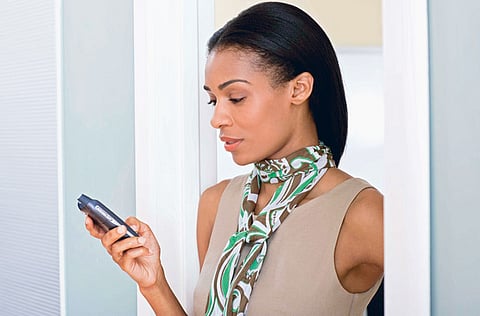Health care to get boost from cellphone technology
Experts says advances in mobile technology will transform the way health care is delivered

Dubai: In the near future you will be able to better manage your diabetes through your mobile phone and get better access to diagnosis and treatment of various ailments, experts said.
Speaking at a conference on mHealth which started on Tuesday, experts said the advances in mobile technology will transform the way health care is delivered and help improve people's lives.
MHealth, or mobile health, is a recent term for medical health and public health practice supported by mobile devices as smartphones.
"This is the dawn of a new era for healthcare," Dr Karim Taga, managing director of Arthur D. Little, said in his opening address.
Telcare, a start-up company in the US, has developed the world's first cellular-embedded glucose meter and it will be launched world-wide at the beginning of next year.
The company is talking to partners here to make it available in the local markets.
"Sixty million people already carry glucose meters," said Jonathan Javitt, CEO of the company. He said this new device will provide immediate feedback from the doctor. If it's a [diabetic] child [at school], the information about sugar levels will be transmitted to a parent or if an elderly patient it will inform the caregiver.
"If you better manage your blood sugar, you can reduce potential complications as strokes or blindness," he said. The cost of the device will be the same as the glucose meter in the market.
The UAE has the second-highest number of diabetics in the world after Naaru, a tiny Pacific island where the lifestyle of its residents suddenly changed after the discovery of minerals.
Remote diagnostics
Clint McClellan, senior director of health and life sciences at Qualcomm, said that as mobile phones become less expensive and more powerful they can be used for remote diagnostics.
"Very soon inexpensive patches as small as a band-aid will be developed which can measure your heartbeat, temperature and hydration and send the data to a doctor through the mobile phone," he said.
He added that people with certain ailments will be "electronically coached" by a doctor on whether there is a need to be more active.
Colonel Ron Poropatich said that every year there are 10,000 missed appointments by wounded servicemen in the US army. Mobile technology has helped many keep their appointments, he said.
Mobile phone technology has also helped keep track of 3,000 patients who have undergone dengue vaccination in a three-year trial study in Thailand, he said.


